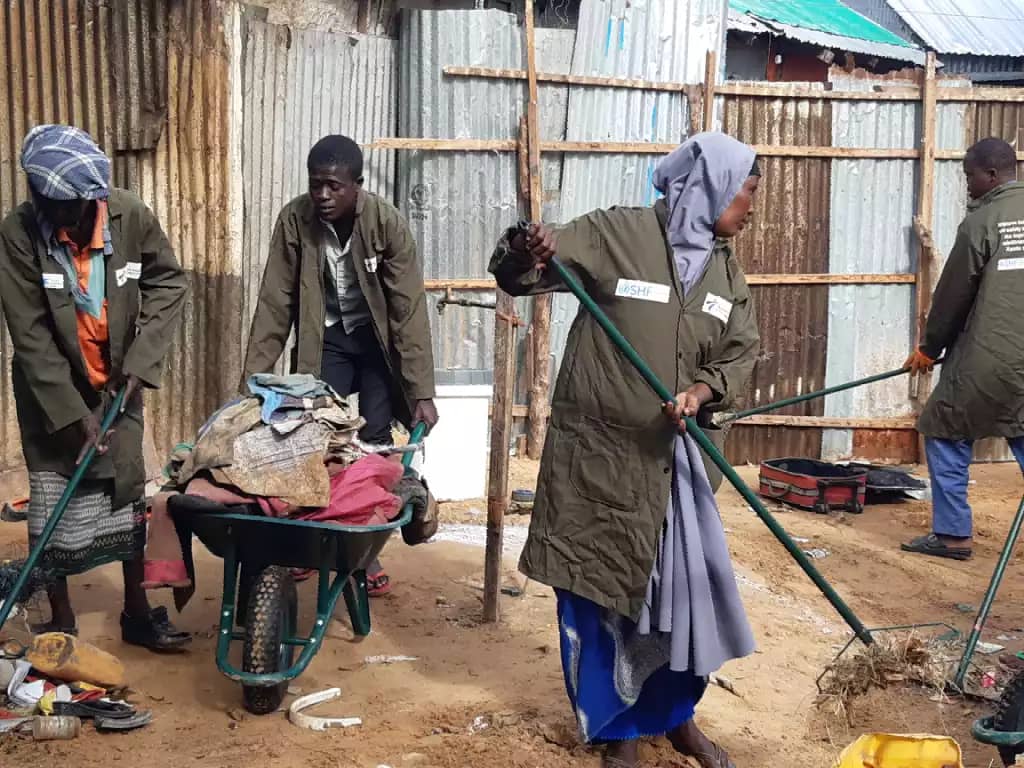For Abdi Daud, 39, father of five, August is the best month in 2019. This is the month he joined other men and women from his community to work in their camp for a cash for work program, and so, according to him, “this is the month where I did not worry about food for my family”. “Before I was a laborer and would wake up every morning with my tools and look for any work in the market. I would get back home at night and just wait to do the same thing the following day”. The program, supported by the SHF as part of a project to help the recovery of populations affected by the conflict and drought in Somalia, was meant to rehabilitate them while employing people from the camp.
Abdi is involved in cash for work activities in a district of Kaxda which, according to him, is an area that “suffers a shortage in income resources and in work opportunities.” “Providing food for my family is my day and night concern,” he adds, “I am only an ordinary laborer whose only fight is to find a job.”
Lack of household cash affects overall community resilience, as households are unable to purchase necessary food and domestic items, subsequently impacting the community. Lack of cash comes from loss of livelihoods and this can compel people to resort to negative coping strategies, such as reducing the frequency of meals or borrowing money.
“This is a very hard time for people,” He said, “prices keep increasing and finding any work opportunity has become increasingly difficult. There is nothing in our hands. All we can do is to be patient.”
This cash for work program is one of the many NoFYL and SHF are implementing across Somalia to support economic recovery. The idea is to immediately increase the purchasing power of vulnerable households in these areas, providing them with the agency to cover their needs.
Particular attention was given to the long-term sustainability of the projects. Abdi contributes to the rehabilitation works of a camp that was selected through consultation with community representatives of the camps to ensure the sites are relevant and identified by them as the most impactful for the wider community.
Like other beneficiaries of the program, Abdi has no steady income, resources or productive assets, which made it incredibly difficult to ensure food for his family. Through this program, NoFYL was able to employ some 200 workers facing Abdi’s situation.
“Cash is an effective intervention because it allows us to procure exactly what we need because everyone here in the program has different needs,” noted Abdi. “I will open a small shop for my wife from the money that I will receive from the program so that at least we can get something little out of it daily”.
Beneficiaries in most camps considered that cash was best since it allowed them to cover what was not met through other assistance provided. In the short term, the cash transfer program provided vulnerable families the means with which to meet their basic needs. In the medium term, the program supported livelihoods recovery by allowing communities to start businesses or buy tools for their work.
Abdi’s schedule of work is comfortable with standard working hours and with the implementation of the activities that is done during daytime and in public spaces. This work schedule is tailored across the sites of intervention, encouraging women’s participation whenever possible.
Abdi is a father and is looking to that camp that he participates in as evidence that tomorrow can be better for his children and all other children in the area. Though the activity will be ending in two months’ time and he will continue to seek permanent employment opportunities to help his family. He is upbeat that life will be better in the future. He also requested that the number of months for the cash for work program to be increased. Through this program, NoFYL was able to employ some 200 workers facing Abdi’s situation.







